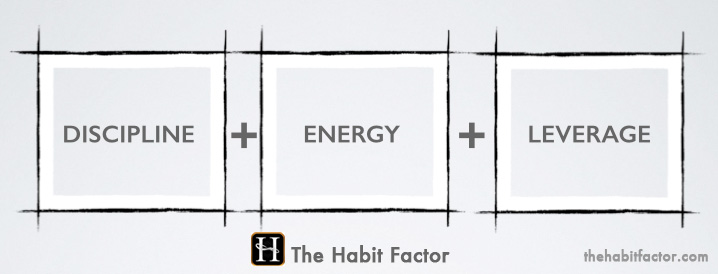Discipline is a habit. Technically, it’s a HABIT, SKILL & TRAIT.
Nobody is born disciplined.
 By: Martin Grunburg
By: Martin GrunburgThe other day, I was listening to a very popular, top-ranked podcast that shall remain nameless and they had a Discipline, Willpower and (bonus) Habit expert on as a guest. The conversation went something like this:
HOST: So discipline is one of those funny things that people talk about a lot but I don’t think is really that clear… I’m not sure I understand the difference between discipline and willpower… are they the same?
EXPERT: I believe discipline is doing the things you need to get done even though you don’t want to.
Sidenote: This is a great definition (not the dictionary one of course but for purposes of productivity it’s perfect AND it is really the same sentiment that Jim Rohn shared decades ago… “discipline is doing what you ought to do when you ought to do it, whether you feel like it or not.”
HOST: How is it different from willpower?
EXPERT: “I think it’s very similar… really the same thing”. “Willpower” he continues “is something Roy Baumeister studied at length (Psychologist and Professor at Florida State)… it’s like a muscle we have, call it discipline… call it willpower…”
“Call it discipline… call it willpower.”
Really?
So, there you have it, another expert who suggests that these two (Willpower and Discipline) are the same.
On the surface it’s easy to see why so many people view these as the same because there is absolutely some overlap. However, after considerable deliberation I’d like to share what I believe Willpower really is…
First, I hope we can agree that discipline is a HABIT. Nobody is born disciplined (see post). THERE ARE NO DISCIPLINED BABIES. (even that little monster above ; )
Discipline is developed over time and becomes strengthened much like a muscle (just like the expert above referenced, BTW: See the HabitStrength™ video).
Aristotle observed that VIRTUE is simply a prolonged and strengthened good habit.
Then, there is WILLPOWER. My favorite definition of willpower might be the ability to demonstrate self control and delay gratification in the moment in accordance with one’s short and long-term goals.
For the record willpower is slightly more complex because it involves discipline and, contains other contributing factors, including: one’s Energy levels and Leverage (motivation). So, the best way to clearly explain willpower is to provide a simple example:
There is a piece of CAKE on the counter. Do YOU eat it?
To understand the KEYS TO WILLPOWER we need to know the three essential factors involved.
Discipline, Energy and Leverage (Motivation).

Let’s give each category a relative score of 1 thru 8 (8 being the highest).
For simplicity we’ll suggest that for each category (discipline, energy, leverage) they are all weighted equally (which may not be the case). Following this model then the highest Willpower Relative Score (WRS) any person “in the moment” could have for any decision/behavior would be a 24.
To have any score (WRS) between 18-24 after calculating said variables would essentially equate to a “no-brainer” decision/action. Meaning, in the moment the participant passes on the cake without much conscious thought. Interestingly of course, that happens to be one of the definitions of “habit”, the idea that a decision or action is made without much/any conscious thought. Hence, you can see the significance of habit when it comes to willpower.
Now, with the “cake on the counter” example; the first question to ask is if the habit (discipline) already exists for passing up the piece of cake. Has this behavior happened before? Better still, is it a habit that has developed over time? If the habit of passing the cake is a consistent behavior (a habit) give yourself a score of anywhere between 6-8. If you rarely pass on the piece of cake give yourself a 1 or 2.
Next, let’s consider the related Energy level of the participant at the time of the decision/action. Since we know that a person’s willpower will wane with their corresponding energy levels (think lack of sleep, food or increased stress which can all decrease one’s willpower).
So, you may be wondering, what happens if the habitstrength for any behavior is high, like a 6 or 7 but their energy is extremely low like a “0” or a “1”? Interestingly, they are still likely to pass on the cake. Don’t take my word for it though, consider what both Ovid, “Nothing is stronger than habit.”And Darwin, “It is notorious how powerful is the force of habit.” have both concluded when it comes to the power of habit to influence our actions and decisions.
What happens though if we take the same example but reduce the habitstrength for “passing on the cake” to a 2 or a 3 and keep the energy levels low at a 0 or a 1. What do you think will happen?
Well, it’s safe to presume that with little energy to do the right thing and no established habitstrength for the action/behavior the participant will almost certainly cave and eat the cake!
Finally, there is another major factor in willpower math and it may be the most influential component; the final piece in the equation is Leverage; one’s motivation for a particular choice or action in the moment.
Think about it this way, If I’m a professional boxer, say Bernard Hopkins and I have a weigh-in tomorrow, (btw: it would cost me millions if I was overweight). So, even if I had low habitstrength, (3 or 4) and low energy (0 or 1), my motivation for doing the right thing in the moment (passing on the cake) is an 8 and it would likely trump all the other factors involved to help ensure that I act in accordance with my short and long-term goals.
So, the next time you are facing a real willpower dilemma, whether it’s hitting the gym, time to study, do the laundry or even just focus on the task at hand consider NOT your willpower but rather the underlying willpower math. ; )
Let me know what you think we should add or subtract from the willpower equation, I’m all ears.
-Martin
BTW: For more on the process of habit mastery checkout this free webinar.
